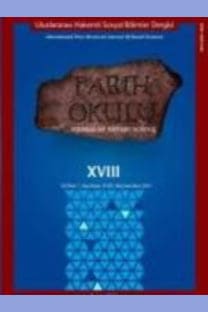THE OTTOMAN CENTRALIZATION POLICY TOWARDS EASTERN PROVINCES BEFORE THE TANZIMAT EDICT
Tanzimat Fermanı Öncesi Doğu Vilayetlerine Yönelik Osmanlı Merkezileşme Politikası
___
Hatt-ı Hümayun (HAT): 80/3319, 107/4245, 107/4270, 272/15927, 288/17298-G, 324/18936-C, 324/18936-E, 373/20404, 373/20404-A, 377/20477-I, 377/20487-A, 378/20514, 395/20874-D, 445/22263, 447/22311-B 448/22317-A, 448/22324, 448/22332-A 448/22335-C, 448/22335-D, , 448/22338-B, 449/22346, 450/22347-B, 450/22350-G, 451/22358, 451/22359, 452/22386, 452/22387, 453/22414- G, 453/22435-A, 490/24028-C, 493/24220-A, 533/26254-B, 637/31417-A, 671/32853, 681/33192-A, 733/34800, 766/36124-C, 794/36840-C, 791/36817-E, 808/37198-A, 808/37198-E, 810/37204-H, 812/37250-K, 816/37294, 825/37404-Z, 1040/43065-J, 1227/47925-E, 1227/47928-F, 1264/48950-A, 1333/51988, 1336/52128.Cevdet Dahiliye (C. DH): 95/4227.
İrade-i Mesâil-i Mühimme (İ.MSM): 48/1225-28, 50/1260, 51/1311, 51/1334, 52/1345.
İrade-i Meclis-i Vâlâ (İ.MVL): 106/2410, 165/4891.
Meclis-i Vâlâ (MVL): 127/4.
Yıldız Esas Evrak (Y.EE): 33/5,1287 (1870).
National Archive, Foreign Office (FO): 78/289, 78/338, 78/366, 78/367, 78/401, 78/870.
Ahmed Lûtfî Efendi, Vak’anüvîs Ahmed Lûtfî Efendi Tarihi, IV-V, Yapı Kredi Yayınları, Istanbul 1999.
ABU-MANNEH, Butrus, “The Islamic Roots of the Gulhane Rescript”, Die Welt des Islams, Vol.34, Issue 2 (Nov. 1994). pp.173-203.
AINSWORTH, W. Francis, “The Assyrian Origin of the Izedis or Yezidis-the So-Called Devil Worshippers”, Transactions of the Ethnological Society of London, Vol. 1 (1861), pp.11-44.
A.B. Cunningham, (Ed.), The Early Correspondence Of Richard Wood (1831- 1841), London 1966.
DERSİMİ, Nuri, Kürdistan Tarihinde Dersim, Dam Yayınları, Istanbul 2014 Derviş Pasha, Tâhdîd-i Hudûd-ı İraniyeye Memur Derviş Paşa Lâyihası, Matbaa-i Amire, İstanbul 1286.
EPPEL, Michael, “The Demise of the Kurdish Emirates: The Impact of Ottoman Reforms and International Relations on Kurdistan during the First Half of the Nineteenth Century”, Middle Eastern Studies, Vol. 44, No. 2, March 2008, pp
GENCER, Fatih, “Merkezîleşme Politikaları Sürecinde Yurtluk-Ocaklık Sisteminin Değişimi” Tarih Araştırmaları Dergisi, Sayı: 49, 2011.
FAHMY, Khaled, Paşanın Adamları Kavalalı Mehmet Ali Pasha, Ordu ve Modern Mısır,(Çev. Deniz Zarakolu), İstanbul Bilgi Üniversitesi Yayınları, İstanbul 2010
MOLTKE, Helmuth von, Moltke'nin Türkiye Mektupları, (Çev. Hayrullah Ors), Remzi Kitapevi, İstanbul 1999.
ŞEREFHAN, Şerefname Kürt Tarihi, (Çev. M. Emin Bozarslan), Hasat Yayınları, İstanbul 1990.
SHIELDS, Sarah D., Mosul before Iraq, State University of New York Press, Albany 2000.
The Missionary Herald, Reports from Northern Iraq 1833-1870, I, (Ed. Kamal Salibi-Yusuf K. Khoury), Royal Institute for Inter-Faith Studies, Amman 1997.
TORAMAN, Ömer, Tanzimat’ın Yurtluk-Ocaklık ve Hükümet Sancaklarında Uygulanması (1839-1864), Fırat Üniversitesi Sosyal Bilimler Enstitüsü, Basılmamış Doktora Tezi, Elazığ 2010.
YILDIZ, Gültekin, Neferin Adı Yok Zorunlu Askerliğe Geçiş Sürecinde Osmanlı Devleti’nde Siyaset, Ordu ve Toplum (1826-1839, Kitapevi Yayınları, İstanbul 2009.
- ISSN: 1308-5298
- Yayın Aralığı: 6
- Başlangıç: 2008
- Yayıncı: Ahmet KARA
SPOR İŞLETMELERİNDE ÇALIŞANLARIN ÇATIŞMA YÖNETİMİ YAKLAŞIMLARI
İBN HALLİKAN’IN VEFEYATÜ’L-A’YÂN İSİMLİ ESERİNE GÖRE SELÇUKLU BİYOGRAFİLERİ
ÜLGENER’İN ORTAÇAĞ İKTİSAT AHLAKI VE ZİHNİYET TAHLİLİNİN TEORİK TASNİFİ
ESKİÇAĞ’DA ARİTMETİK VE EUCLEIDES ALGORİTMASI
CUMHURİYET’İN İLK DÖNEMLERİNDE AĞRI’DA EĞİTİM (1923-1945)
THE OTTOMAN CENTRALIZATION POLICY TOWARDS EASTERN PROVINCES BEFORE THE TANZIMAT EDICT
